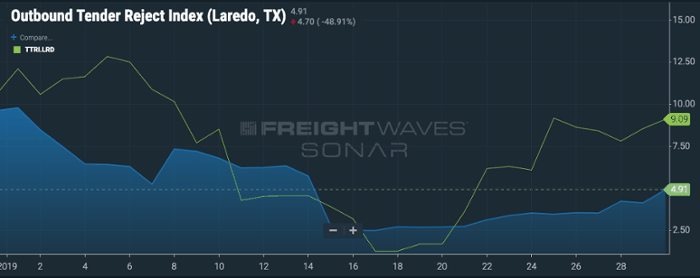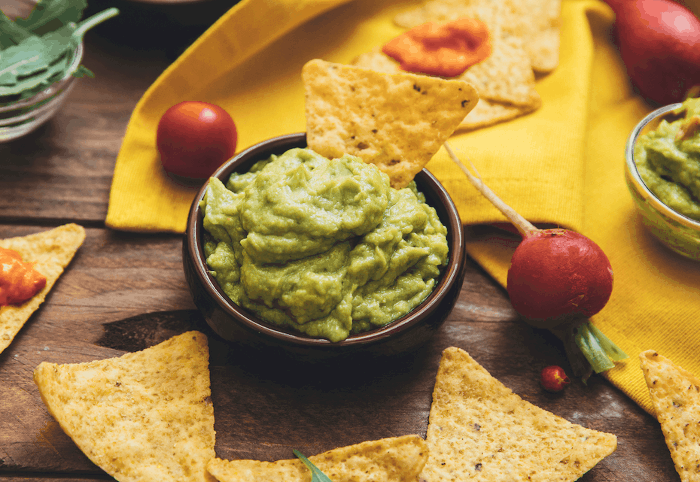If it’s green, no cuisine…if it’s brown, don’t put it down (buy it!)
Whether you’re pulling for the Patriots or the Rams, one thing is virtually guaranteed…you’re going to want some delicious dip on the other end of that tortilla chip. If you’re doing some last-minute searching online for the perfect guacamole recipe (and you don’t want to use edamame beans because your friends will ridicule you), you’re going to need some avocados!
Last year, the U.S. brought in 44,181 full truck loads of avocados from Mexico, with volume projected to rise 9 percent in 2019 to over 48,000 full truck loads (that’s over two billion pounds)! Of course, we see a big surge in volume just before the Super Bowl, with many truckloads of avocados prepositioned in stores just in time to be ripe at kick-off.
Super-food
Guacamole is just one of the many ways you can enjoy this super-food during the Super Bowl. Not only are these alligator pears insanely delicious, they’re actually quite good for you too. Turns out, avocados contain nearly 20 vitamins and minerals, they don’t have any sodium or cholesterol, they’re a great source of fiber, and they’re naturally high in fat (the good kind).
Besides chicken wings, pizza and beer— avocados are always high on the grocery list during Super Bowl weekend. In fact, the data on food consumption during the most-watched television event of the year might shock you. More than 52 million cases of beer are sold. In addition, 1.3 billion chicken wings (with thousands of gallons of ranch and bleu cheese dressing), 9 million pizzas, 12 million pounds of potato chips, 4 million pounds of popcorn are eaten, and of course, nearly 300 million of our little green friends we call the avocado.
Just like any other commodity, there are ebbs and flows that drive prices (better known as supply and demand). In regard to avocados, there are several factors (besides the seasonal demand) that have consumers worried about this season’s crop.

Supply chain disruption
As Americans consume more avocados each year than the year before, domestic production hasn’t been able to keep up with demand. In recent years, there has been an increasing need for imports from other countries to keep everyone stocked with plenty of avocados. The Mexican state of Michoacán, the country’s largest producer of avocados, has played a big role in U.S. imports over the last 20 years, and continues to increase production. Not only is Michoacán the country’s largest producer of avocados, it is the only state currently allowed to export fresh Hass-branded avocados into the United States. In order for an orchard to become certified, there are pre-harvest examinations and surveys, sanitation requirements, as well as post-harvest safeguards.
In addition to all the scrutiny of the orchards, there are inspections at the packing house as well. The fruit is randomly cut and sampled to proactively avoid any unforeseen issues. These inspections are required to be conducted in three separate locations—in the field, at the packing house, and by an inspector at first port of arrival in the United States. Trace-back labeling is also a prerequisite in case there are recalls for any reason, including an issue with the use of pesticides in which a specific ‘lot’ would need to be quarantined or disposed of.
Unfortunately, at the end of October 2018, there was a strike in Mexico due to disputes between growers and distribution/packing companies. Following a 16-day strike, avocado production fell 88 percent two weeks later. This shortfall in production caused chaos in November avocado shipments from Mexico. Even though the strike was resolved, many distributors believed it could still take some time before supplies returned to normal.
One challenge to the disruption in the avocado supply chain is that when avocados are first harvested, they are as green as grass and hard as a rock. So unless you’re using an avocado to play baseball, only time (combined with moderately warm temperatures) transform them to the ripened state where the consumer can actually use them. Because of the interruption in the supply chain from Mexico, many restaurants took guacamole off the menu for a short while. Even though the supply eventually returned to normal, restaurants weren’t willing to make a concession on taste or quality by using avocados that were not yet ready to be served.
Fuel theft disrupts avocado harvest
As the supply chain began recovering from the strike in November, Pemex, the government-controlled Mexican oil company, changed its distribution network in December to combat massive fuel theft by organized crime rings. Although a strong move in the right direction by newly elected Mexican President Andrés Manuel López Obrador, the extended fuel shortage has left six Mexican states (including Michoacán) without enough fuel to harvest and ship out the avocado crop in time for the big game. The last three weeks of January are always the most crucial time to ship avocados to the U.S. to meet the Super Bowl-fueled demand.
Avocados enter the commercial zone
After the avocados are picked and packaged, they are brought over to the Laredo, Texas market through the Mexican border. The loads coming across the border go through custom brokers who cross-dock the freight from the Mexican carriers. Since the avocados go through final inspection while kept in (limited) cold storage facilities, this can cause lengthy delays depending on the amount of equipment and inspectors available.
These delays are amplified by having to wait on specialized equipment (mainly reefer trailers) to insulate a load from falling below 38 degrees (in order to protect the avocados from freezing). Since produce season starts in early spring in Laredo, this puts additional strains on reefer capacity to handle the avocado imports. Normally, tender rejections on refrigerated freight will trend upwards going into the first week of February as shippers are moving the avocados to the grocery shelves for the Super Bowl Sunday demand. This year, we saw a run-up in outbound tender rejections (nearly doubling) in the Laredo (OTRI.LRD) and surrounding markets as we approach the Super Bowl. Even more interesting was the distance avocados were traveling as they entered the U.S. In SONAR (TTRI.LRD) we can see that tender rejections for “tweener loads” in the 450-800 mile have increased nearly 200 percent in the last three weeks, which suggests shippers were finding capacity tight for loads destined for larger cities like Dallas and New Orleans.

According to a press release from Avocados From Mexico in Irving, Texas, nearly 72 million pounds of avocados entered the U.S. by the second week of January. So even with all the cards seemingly stacked against us, recent reports indicate there shouldn’t be a negative impact on avocado imports to the U.S. So as Gladys Knight sings the National Anthem before the kickoff in Atlanta tomorrow, there should be enough avocados for all the guacamole you plan to make (or eat!). Fortunately, just like any craze or fiasco…if you can wait it out, this too shall pass.
So if you’re still set on making that delicious dip tomorrow, don’t fumble around with a green one, be sure to get one that’s ripe!
May your favorite team win Super Bowl LIII!










